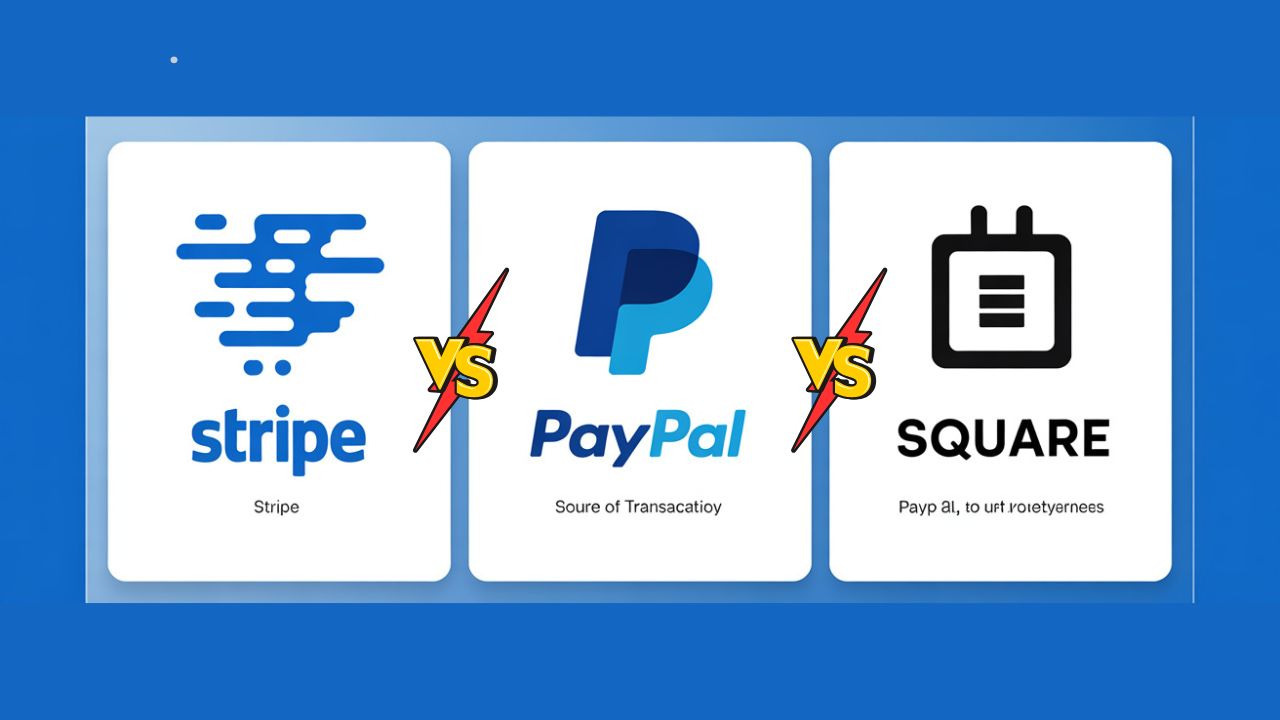Stripe vs PayPal vs Square: Which Payment Gateway Wins in 2025? Selecting a payment gateway remains a vital business consideration today and will remain the same in 2025. Every consumer prefers online shopping coupled with easy payment options. All three players are payment gateways used in the United States of America, such as Stripe, PayPal, and Square. Each payment gateway has different payment structures with benefits, charges, and payment features, each providing competitive options. However, who suits your business needs the most? Let’s compare and discuss in detail.
What Is A Payment Gateway?
Payment gateway technology helps businesses facilitate payment online through card processing or face-to-face through credit cards at POS systems. It is vital in securely processing credit cards, debit cards, and even digital wallets. This helps link your website or the point of sale to financial services with the bank. A good payment gateway provider, like PayPal, Stripe, and Square, ensures that payments from merchants and customers are done conveniently.
Quick Overview of Stripe Vs PayPal Vs Square
PayPal, founded in 1998, is one of the oldest payment gateways. Stripe started in 2010, providing services to software developers and other specialized businesses, helping them with payments via various tools while serving customers and managing payments across borders.
As one of the most trusted online payment platforms, PayPal has hundreds of millions of users and an easy-to-quit account with a recognizable “Pay with PayPal” button. Founded in 1998, PayPal accepts transactions from users worldwide.
In 2009, Square emerged as a mobile card reader but has since evolved to serve as a comprehensive, tailored business platform providing essential hardware and software solutions specially designed for small and retail businesses.
Features and Capabilities
Along with supporting over 135 currencies, Stripe supports all major cards, digital wallets such as Apple Pay and Google Pay, bank transfers, and some cryptocurrencies. It offers advanced fraud protection, subscription billing, and other protective features.
With its international user base, PayPal is one of the most user-friendly payment options. Payments can be made through a card, PayPal balance, US Venmo, and “Pay Later” options.
Along with offering invoicing and business management tools, Square provides users with sophisticated online store-building features. The company is recognized for its excellence in card reader and terminal services.
Fees and Pricing
In-person transactions with Stripe incur a fee of 2.7% + 5 cents, while online payments will incur a 2.9% + 30 cents fee. An additional 1% is added for international payments.
PayPal charges 2.99% and 49 cents for online transactions, with a higher fee for PayPal Checkout. Zettle hardware has a lower in-person fee of 2.29 and 9 cents.
Square Online charges 2.9% plus 30 cents, while Square in-person charges 2.6% plus 10 cents. Basic accounts have no monthly account fees and limited chargeback expenses.
Integration and Customization
Designated payment solutions best serve businesses through Stripe. Its complex APIs make integrations easier for SaaS companies and marketplaces.
PayPal works best when you need something that doesn’t require heavy coding and offers instant integration with e-commerce stores.
For small businesses seeking an all-in-one solution, Square’s seamless integration between its POS hardware and online tools is unmatched.
Security and Compliance
All three platforms equally comply with the PCI DSS standard, use encryption as payment safeguards, and offer Stripe Radar. Each platform also provides unique fraud protection and buyer/seller payment assurances. Square encompasses chargeback protection.
User Experience and Support
Flexible support hours are a bonus for paid plans, while unresponsive developers turn off potential Stripe users. PayPal users have phone and chat options, while Square customers are directed to emails and customer support lines.
Scalability and Business Suitability
Stripe is appropriate for startups, technology companies, and any businesses with complicated or global payment systems. PayPal is appropriate for freelancers and small businesses, as well as for those who value brand recognition. Physical retail stores, mobile vendors, and small businesses that need a POS system with the capability for integrated online sales are best served by Square.
Pros and Cons Summary
Stripe has global reach and flexible offerings; however, developer tools are a prerequisite. PayPal provides brand recognition and ease of use, but sometimes has higher fees. Square has excellent hardware and an all-in-one system, but lacks for complex online businesses.
| Feature | Stripe | PayPal | Square |
|---|---|---|---|
| Best For | Online businesses, SaaS, global e-commerce | Freelancers, small businesses, consumer trust | In-person retail, restaurants, mobile sellers |
| Ease of Setup | More technical, developer-focused | Very easy, plug-and-play | Simple for POS, easy for small biz |
| Online Transaction Fee | 2.9% + $0.30 (US) | 2.89% + $0.49 (US); varies by method | 2.9% + $0.30 |
| In-Person Transaction Fee | 2.7% + $0.05 (card-present) | 2.29% + $0.09 (Zettle) | 2.6% + $0.10 |
| International Fee | +1.5% | +1.5% | Limited international support |
| ACH/Bank Transfer | 0.8%, $5 cap | 3.49% + $0.49 (e-check), $300 cap | Not standard |
| Chargeback Fee | $15 | $20 | $0 (up to $250/month covered) |
| Recurring Payments | Built-in, no extra cost | Available, higher per-transaction fees | Available |
| Supported Currencies | 135+ | 25+ | Limited |
| Hardware | Limited | Zettle POS for in-person | Leading POS hardware options |
| Customization | Highly customizable, strong APIs | Less customizable | Best for Square ecosystem |
| Brand Recognition | High with developers/tech | Very high with consumers | High with small businesses |
| Security | Advanced fraud tools, PCI DSS compliant | Buyer/seller protection, PCI DSS compliant | Chargeback protection, PCI DSS compliant |
| Market Share (2024) | 17.15% | 45.52% | Not specified |
| Supported Countries | 47 | 200+ | US, Canada, UK, AU, NZ |
Summary:
- Stripe is best for online, global, and developer-driven businesses needing customization.
- PayPal is ideal for quick setup, consumer trust, and small businesses.
- Square excels for in-person retail, restaurants, and mobile sellers with top POS hardware.
Fees and features may vary by business type and transaction volume. Always check current rates and terms for your specific needs.
2025 Trends and Innovations
All three gateways are adopting AI-powered fraud detection technology and offering Pay Later services (both in smaller installments and after the product has been delivered). They also accept cryptocurrency payments and focus on mobile and contactless payments. The integration of omnichannel sales, combining offline and online sales, is on the rise.
Which Payment Gateway Wins in 2025?
Your business dictates which gateway will be best for you.
If you need customization and global support while having technical resources, choose Stripe.
If you want fast setup and broad audience appeal with high consumer confidence, choose PayPal.
If you run a physical store and require an integrated sales system, Square is the best option.
All are trustworthy and advanced, and connect your company with innovative new technology. Choose one that best aligns with your model and objectives.
We’ll gladly hear your questions or comments on any of these platforms in the comments below.
You may read this: Top 10 ESG Investment Funds to Watch in 2025 – A Complete Guide











